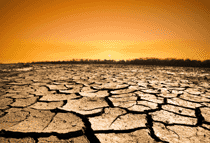According to the National Academy of Sciences, data from the past 30 years shows a clear connection between weather-related food shortages and conflict in Africa. They cite Darfur as an example, where 200,000 people have died, and 2,000,000 are refugees because of a war that is partially about who will control scarce resources after three decades of drought. How to allocate the shrinking water supply has been a point of conflict between Israel and Syria, and is one of the many reasons why the nations cannot reach a peace accord.
Looking to the future, scientists and academics predict more wars caused by climate change. The Middle East, sub-Saharan Africa, and parts of Asia are viewed as the most vulnerable locations. Intelligence analysts believe issues with scarce resources could topple governments and spark terrorist activities. The Department of Defense is concerned enough, after seeing detailed climate models from the Air Force and NASA, that they now include the projected effects of global warming in their national security plans.
|












